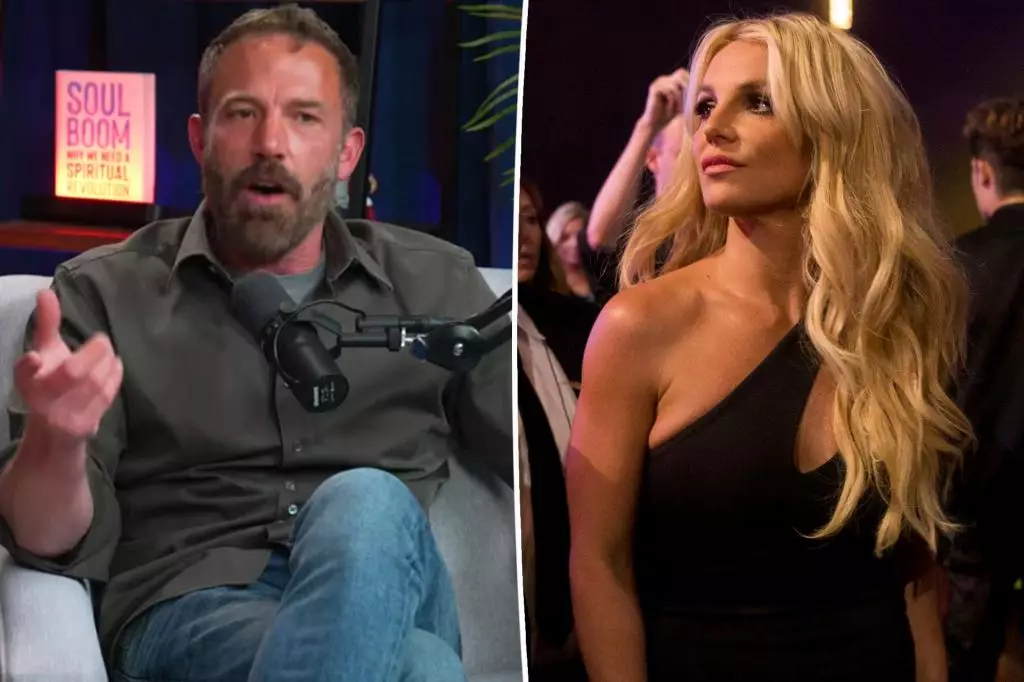In an era dominated by social media and the relentless pursuit of fame, celebrity culture has evolved into a double-edged sword. On one hand, it offers stars like Britney Spears the opportunity to reach and connect with millions; on the other, it subjects them to an invasive level of scrutiny and harassment. Recent comments made by Ben Affleck during his appearance on “This Past Weekend With Theo Von” shone a light on this epidemic, as he reflected on the treatment of Spears during one of the most tumultuous phases of her life. Affleck’s candidness about his empathy for Spears speaks to a larger issue: the moral responsibility that comes with fame and how society often fails to wield it wisely.
Affleck’s acknowledgment of the “collective cruelty” of paparazzi culture illustrates how the entertainment industry often commodifies pain for profit. When Spears was at her lowest—her very public struggles culminating in a mental health crisis—she was not just battling her demons; she was simultaneously being chased and taunted by cameras. This dynamic begs the question: are we, as consumers of media, complicit in this systemic exploitation? The incessant clicks of cameras are not merely documenting events; they instead capture raw human suffering, transforming personal crises into sensational headlines.
A Culture of Cruelty
Affleck aptly noted that the images we consume are often devoid of context. The fleeting snapshots of a “growling animal,” as he metaphorically described the distressed celebrity, strip away the backstory. Instead of seeing Spears as a person navigating adversity, we often view her as a character in a tragic spectacle. This observation raises pressing ethical questions about the nature of voyeurism in our society. Why do we find entertainment in others’ misfortunes? What does this say about our own values?
It’s as if the relentless hammering by the paparazzi intensified Spears’s struggles, exacerbating an already precarious situation. The discomfort felt by onlookers—whether empathetic or morbidly fascinated—illustrates an unsettling truth about our relationship with celebrity: we often prefer the drama over dignity. Spear’s narrative, which found her at the mercy of public scrutiny during a dismal chapter of her life, is a harrowing reminder that behind every headline, there exists a human being deserving of compassion.
The Narrative of Masculinity
Affleck’s reflections are particularly poignant, arriving as they do from a man who himself has navigated the complexities of fame in the public eye. With his carefully crafted image, Affleck’s comments serve as a necessary indictment of toxic masculinity that sometimes envelops men in Hollywood. Their stories, often overshadowed by the women in their lives, can be laden with notions of stoicism that discourage vulnerability. By expressing empathy for Spears, Affleck subtly challenges these stereotypical constructs, promoting emotional awareness in an industry notorious for its emotional detachment.
Moreover, the actor’s distancing from the rumored past romance with Spears not only underlines an aspect of celebrity life—where anecdotes can become exaggerated through the lens of fame—but also reveals an important lesson about acknowledging one’s history without letting it dictate one’s narrative. In a world clamoring for connection, Affleck’s reflections remind us to cultivate compassion, which is often overshadowed by the glaring lights of scrutiny.
The Price of Fame
The gravity of these conversations about paparazzi culture transcends the narrative of individual celebrities; they reveal a pervasive truth about fame itself. The high price of notoriety often comes at the cost of mental health. Spears’s journey, marked by public breakdowns and eventual conservatorship, serves as a case study of what happens when the line between celebrity and human being is blurred. Here lies a call to action for societal change: to challenge the current paradigm that glorifies predation in celebrity culture.
Affleck’s comments will hopefully ignite a deeper discussion among Hollywood’s elite and their audiences about the true consequences of fame. By understanding the very human narratives behind celebrity moments captured by the paparazzi, perhaps we can shift our perspective from one of entertainment to empathy—a change that may lead to a healthier narrative for all involved.
Through Affleck’s thoughtful acknowledgments, we are urged to recognize the human cost of celebrity culture. As we navigate the fragile landscape of fame, let us remember that every public figure is, above all, a person deserving of respect and dignity—an insight that, although simple, has often proven difficult to embrace in what can sometimes seem an exceptionally harsh world.


Leave a Reply